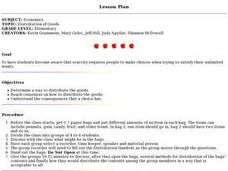Federal Reserve Bank
Monster Musical Chairs and Scarcity
Why can't we have everything we want? Youngsters are introduced to the concept of scarcity through a game of musical chairs and by discussing what it takes to satisfy our wants.
Illustrative Mathematics
Field Day Scarcity
Introduce young mathematicians to concepts of financial literacy with this open-ended word problem. With seven dollars to spend during field day and given a list of available items and their prices, children must determine how they want...
Curated OER
Scarcity, Choice and Decisions
Students study the basic economic trilogy (scarcity, choice, and costs). In this money management lesson, students use a scenario of a High School Prom to calculate how scarcity, choice and cost apply by completing provided worksheets...
Curated OER
Economics during the Civil War
Students synthesize the concepts of scarcity, supply, and demand, pertaining to the Civil War time period. For this economics lesson, students gain understanding of economic terms through read-alouds, Venn diagrams, (comparing lifestyles...
Curated OER
Distribution of Goods
Students study the concept of scarcity and that it requires people to make choices when trying to satisfy their unlimited wants. Groups are given bags of items and must distribute the items in the bag in a way that is acceptable to...
Curated OER
Scarcity and Choice
After reading the book A Bargain for Frances, young economists discuss how money is exchanged for goods or services. They demonstrate effective financial decision-making by listing ways to save money for a product they would like to buy.
Curated OER
The Mitten
Students read the book, The Mitten and make a list of animals that moved into the mitten. In this literature lesson plan, students discuss why we like to have nice, warm places to live, and what happens when there isn't enough space for...
Curated OER
Choice, Opportunity, Cost and Decisions
Students discuss the definition of scarcity and tradeoffs, and the differences between choice and cost. They create budgets and must provide tradeoffs for some of their choices.
Curated OER
Economics Unit I - The Basics
Twelfth graders access how scarcity requires individuals and institutions to make choices about how to use available resources. They explore the characteristics of different economic systems and institutions. Student are able to describe...
Curated OER
Introduction to Economics
Students discover the basic economic problem: scarcity; examine how "there is no such thing as a free lunch" (opportunity costs); and define economics. They act out a play demonstrating basic economic principles.
Curated OER
The Soviet Choice For Growth
High schoolers examine five major events in Soviet History to introduce the concept of opportunity cost. They identify considered alternatives at the time of decision and examine benefits and cost. They apply these ideas to a typical...
Curated OER
Scarcity and Choice
Students participate in a role play as producers of two goods, allowing students to experience scarcity. They make choices about using their scarce resource to produce both or one of two goods. Then they construct...
Curated OER
Scarcity and Choices
First graders gain an understanding of the scarcity of resources and how it affects the choices that we make in our everyday lives. Students will participate in a variety of activities such as literature analysis, shopping, journal...
Curated OER
Conserving Water through Art!
Students study water conservation. In this water conservation lesson, students investigate the scarcity of water and determine reasons for conserving water. Students estimate how much water they use in one day and identify ways to...
Workforce Solutions
Workforce Solutions 2-3 Lessons
Four lessons and an at-home connection examine 12 jobs. Beginning with an interactive map, scholars view and discuss each one within their small group. Groups focus on the products provided and on their scarcity. Finally, pupils look...
Curated OER
Water, Water, Everywhere (High School)
Students view different types of water to make the point that salt or polluted water isn't useful for drinking water. They chart causes, consequences and solutions to water scarcity based on internet research. They write an essay as...
Visa
Savvy Spending: Sharpening Money Decisions
Do you really need that new laptop/phone/dress/jacket/etc.? Financial decisions require us to distinguish between our wants and our needs. Through discussion and the evaluation of scenarios on provided worksheets, this resource...
Curated OER
Money Smart children
Learners elementary financial vocabulary words: spend, save, invest and donate. In this finance lesson, students respond to the story "Sam and the Lucky Moon." Learners describe the concepts of wants and needs, resources, scarcity,...
Curated OER
Spend, Save, Invest or Donate (9-12)
Students explore the concept of personal finance. In this philanthropy instructional activity, students examine decisions they make about money as they discover the definitions of philanthropy, resources, scarcity, choice, benefits,...
Michigan Sea Grant
Water Quantity
It may be tricky for a young mind to conceptualize that less than 1% of all water on earth is useable for humans to drink. Simulating the amount of fresh water available on earth by removing measured amounts of water from a five-gallon...
Curated OER
Survival Extravaganza
Fifth graders discuss the effects of scarcity. In this survival lesson, 5th graders use strategies that would help them survive in a survival situation. Students write letters about bears in need of help to survive. Students answer...
Curated OER
Oh Deer! and English Learner Writing Extensions
Students follow deer through Yellowstone Park and record the number of deer from year to year. In this basic needs of deer lesson, students work in small groups and chart the number of deer each year and give explanations using as...
Advocates for Human Rights
The Right to a Clean Environment: Water
First, young citizens learn about water consumption by doing some research themselves on their home water usage and sharing their findings with the class. Then, they do some brainstorming and devise a plan to reduce water consumption.
Curated OER
WWJD: What Would Jimmy Do?
Young scholars interpret historical evidence presented in primary and secondary resources. In this 1973 oil crisis instructional activity, students research details regarding President Carter's policies regarding the oil crisis that...

























